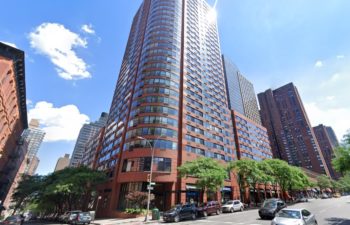
Carnegie Park Tower. Image Credit: Google Maps
Developer evicted elderly and disabled tenants lacking leases from building converted to condominiums. In April 2014, Carnegie Park Tower, LLC submitted a non-eviction offering plan to the Office of the New York Attorney General to convert rental units into condominiums in the building it owned at 200 East 94th Street in Manhattan. The plan provided that no non-purchasing tenant would be evicted because of the building’s conversion to condominiums. The plan became effective in August 2015, after 51 percent of the tenants opted to purchase their respective units.
In between the filing and effective date of the non-eviction plan, the landlord refused to renew the leases of tenants who opted not to purchase their respective units.
Tenants affected by the landlord’s refusal to renew leases sued the landlord for breach of contract and unlawful eviction. The tenants claimed the landlord breached the non-eviction plan by failing to provide them with lease renewals during the period before the offering plan was effective. The tenants also claimed the landlord violated the General Business Law by failing to provide senior citizen and disabled tenants with a form to declare themselves as non-purchasing tenants, a status that would have allowed the tenants to remain in their homes without being subjected to eviction or unconscionable rent increases.
The landlord moved to dismiss the claims. The landlord asserted the non-eviction plan defined non-purchasing tenants as those with an occupancy right on the plan’s effective date. The landlord also asserted that the protection under the General Business Law applied only to qualified tenants under an eviction plan, and not a non-eviction plan.
New York County Supreme Court Justice Sylvia G. Ash agreed with the landlord and dismissed the tenants’ complaint. The tenants appealed.
The Appellate Division, Second Department affirmed the Supreme Court’s decision to dismiss the tenants’ claims. The court ruled that the landlord’s refusal to renew tenants’ leases during the period prior to the plan’s effective date was lawful and not in violation of the offering plan.
The court also ruled that the General Business Law did not entitle senior citizen and disabled tenants to protection from a non-eviction plan at the time the tenants were forced to leave their homes. The rights asserted by the tenants were enacted by the legislature in 2019 and did not apply retroactively to the tenant’s claims.
Kessler v. Carnegie Park Associates, L.P., 137 N.Y.S.3d 80 (2d Dep’t 2020).
By: Nicholas Negron (Nicholas is a CityLaw intern and a New York Law School student, Class of 2022.)

